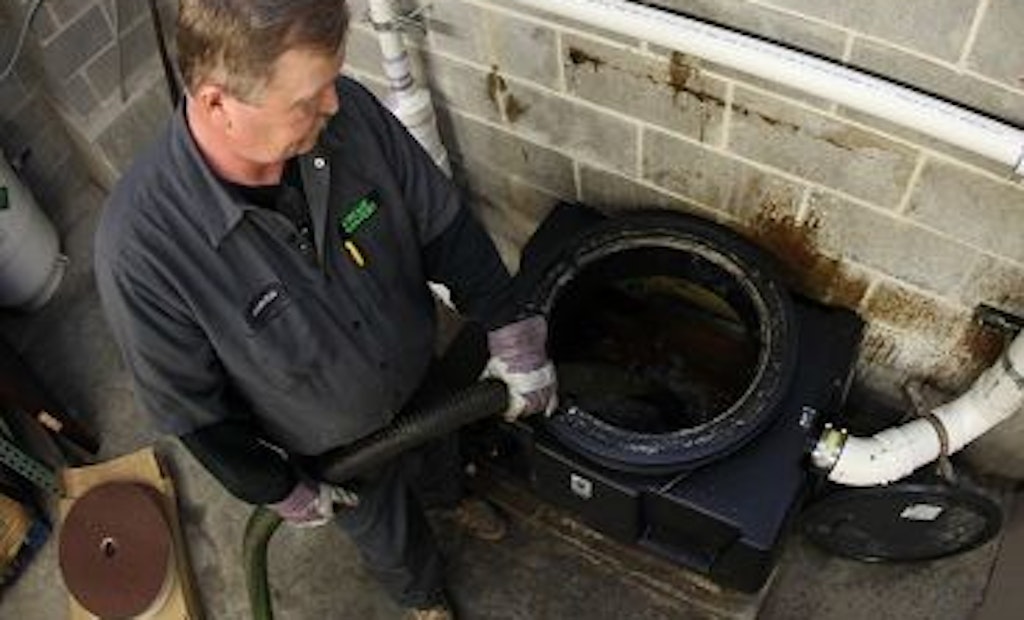
Interested in Grease?
Get Grease articles, news and videos right in your inbox! Sign up now.
Grease + Get AlertsWhen 3-year-old Wyatt Scharenbroch stumbled into a restaurant grease pit recently in Grand Chute, Wisconsin, his parents were shocked, scared and thankful he survived. He fell in after stepping on a reportedly unsecured cover on a grease trap in a Denny’s parking lot.
His father pulled Wyatt out by his collar – getting him out safely, but obviously covered in smelly, sticky grease. Not a pleasant experience, but much more than that – a possibly litigious circumstance for the parties involved.
While the little boy was fine, the incident does call into question the securing and maintenance of grease traps. Just who is responsible for them? And how often should they be maintained?
In the Wisconsin incident, fire personnel on the scene ensured the manhole covers were secure and in place. And the local public health department told a northeast Wisconsin TV station, “The securing of covers on the grease pit doesn’t fall under the licensing and inspecting that we do as a public health agency.”
In most cases, public safety and industry experts agree, it is a restaurant’s responsibility to make sure covers on grease pits are secure.
Maintenance is key
John Remstedt, owner of Grease Masters in St. Louis, says regulations regarding grease traps may vary by state and even municipality. Some bigger cities have well-established ordinances, especially since the Environmental Protection Agency (EPA) started cracking down on grease discharges.
Some states’ EPA compliance guidelines are posted online. For example, guidelines from the Ohio EPA note, “It is important that your grease trap is properly sized, installed and maintained. Proper maintenance will help ensure that your grease trap is functioning properly, minimizing the amount of grease that ends up in your wastewater. However, grease trap maintenance is often neglected, so be sure to have the trap inspected and cleaned out regularly.”
Remstedt especially agrees on that last point, maintenance – something he feels many restaurant owners are either unaware of or unwilling to address. “People who think they want to open a restaurant don’t [often] think about maintenance,” he says.
And while he estimates about 90 percent of restaurant owners are compliant regarding grease traps – “because they have to be,” he says – others remain surprisingly ignorant when it comes to something as basic as even locating their grease trap.
Many owners, he says, look only at their used cooking oil as their grease trap. “They don’t even know about the grease trap in the parking lot,” Remstedt admits. But it’s their property and it’s their responsibility, he notes.
“Everything falls back to the generator of the grease.”
Still, finger-pointing does occur. In the Wisconsin case, a Denny’s spokesperson told reporters, “Our concern is first and foremost with the safety of the young boy in this situation. We contract a third-party vendor to maintain and service these grease pits and our expectation is that they are secured every time this restaurant is serviced. We are working closely with our vendor to ensure that they are following their procedures to make sure that the covers are secured each time they visit.”
Remstedt says it’s important to note that accidents such as a snowplow dislodging a grease trap cover in a parking lot can happen – so blame and responsibility often get muddied.
Remstedt says it’s prudent for restaurants to take preventive measures before spills, leaks and near-miss tragedies like the Wisconsin one occur.
“Prevention is the key … don’t be in a hurry. Make sure your technicians close all manhole covers.”
Having restaurant clients establish a maintenance and cleaning schedule is equally important, Remstedt says, to avoid bigger problems – such as sewer issues – down the road.
Some larger restaurants and chains will have regular maintenance schedules in place; smaller and independent establishments may not.
“Most reasonable restaurants are on a maintenance program,” he says. “For big chains, this stuff is just automatic. Most restaurants get their grease traps cleaned on a quarterly or monthly basis,” he says, adding that he will notify the customer of any potential violations. But some customers try to delay their cleanings to save money.
But when there is a problem, Remstedt and others become grease-hauling heroes, often much to the dismay – and cost – of the frenzied customer.
“In an emergency situation, when we jump, people are more than willing to pay to make their problem go away,” he says. That especially goes for spills and leaks.
According to Remstedt, “They try to handle them on their own 80 percent of the time … and 90 percent of the time, we get a phone call.
“We’re out of sight, out of mind,” Remstedt says. “As long as everything starts working properly, they don’t think about us.”





